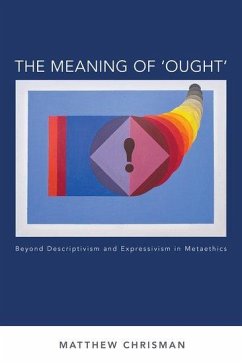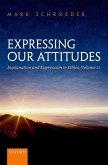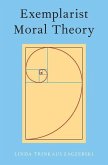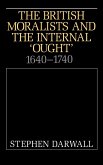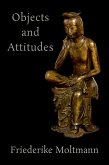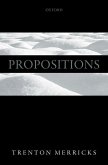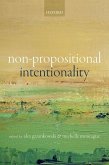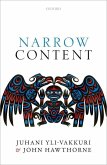- Gebundenes Buch
- Merkliste
- Auf die Merkliste
- Bewerten Bewerten
- Teilen
- Produkt teilen
- Produkterinnerung
- Produkterinnerung
Building on a careful truth-conditionalist semantics for 'ought' considered as a modal word, Chrisman argues that ought-sentences mean what they do neither because of how they describe reality nor because of the noncognitive attitudes they express, but because of their inferential role.
Andere Kunden interessierten sich auch für
![Expressing Our Attitudes Expressing Our Attitudes]() Mark SchroederExpressing Our Attitudes98,99 €
Mark SchroederExpressing Our Attitudes98,99 €![Exemplarist Moral Theory Exemplarist Moral Theory]() Linda ZagzebskiExemplarist Moral Theory126,99 €
Linda ZagzebskiExemplarist Moral Theory126,99 €![The British Moralists and the Internal 'Ought' The British Moralists and the Internal 'Ought']() Stephen L. DarwallThe British Moralists and the Internal 'Ought'108,99 €
Stephen L. DarwallThe British Moralists and the Internal 'Ought'108,99 €![Objects and Attitudes Objects and Attitudes]() Friederike MoltmannObjects and Attitudes104,99 €
Friederike MoltmannObjects and Attitudes104,99 €![Propositions Propositions]() Trenton MerricksPropositions89,99 €
Trenton MerricksPropositions89,99 €![Non-Propositional Intentionality Non-Propositional Intentionality]() Non-Propositional Intentionality100,99 €
Non-Propositional Intentionality100,99 €![Narrow Content Narrow Content]() Juhani Yli-VakkuriNarrow Content77,99 €
Juhani Yli-VakkuriNarrow Content77,99 €-
-
-
Building on a careful truth-conditionalist semantics for 'ought' considered as a modal word, Chrisman argues that ought-sentences mean what they do neither because of how they describe reality nor because of the noncognitive attitudes they express, but because of their inferential role.
Hinweis: Dieser Artikel kann nur an eine deutsche Lieferadresse ausgeliefert werden.
Hinweis: Dieser Artikel kann nur an eine deutsche Lieferadresse ausgeliefert werden.
Produktdetails
- Produktdetails
- Verlag: Oxford University Press
- Seitenzahl: 280
- Erscheinungstermin: 23. Oktober 2015
- Englisch
- Abmessung: 236mm x 155mm x 23mm
- Gewicht: 499g
- ISBN-13: 9780199363001
- ISBN-10: 0199363005
- Artikelnr.: 47869024
- Herstellerkennzeichnung
- Libri GmbH
- Europaallee 1
- 36244 Bad Hersfeld
- gpsr@libri.de
- Verlag: Oxford University Press
- Seitenzahl: 280
- Erscheinungstermin: 23. Oktober 2015
- Englisch
- Abmessung: 236mm x 155mm x 23mm
- Gewicht: 499g
- ISBN-13: 9780199363001
- ISBN-10: 0199363005
- Artikelnr.: 47869024
- Herstellerkennzeichnung
- Libri GmbH
- Europaallee 1
- 36244 Bad Hersfeld
- gpsr@libri.de
Matthew Chrisman is a Reader in Philosophy at the University of Edinburgh. He came to Edinburgh after earning his PhD and MA at the University of North Carolina at Chapel Hill and his BA at Rice University. His research is focused on ethical theory, the philosophy of language, and epistemology. He has published widely in these areas, including articles in the Journal of Philosophy, the Australasian Journal of Philosophy, Oxford Studies in Metaethics, Philosophy and Phenomenological Research, Philosophers' Imprint and Philosophical Studies.
* 1. Introduction
* 1.1. The Ubiquity of 'Ought'
* 1.2. Some Initial Theoretical Cartography
* 1.3. Metanormative Theorizing and the Philosophy of Language
* 1.4. Compositional Semantics, Some Basics
* 1.5. The Word 'Ought'
* 1.6. Plan
* 2. 'Ought's, Obligations, Reasons, and Values
* 2.1. Introduction
* 2.2. Formal Framework and Toy Analysis of 'Ought'
* 2.3. An Initial Ambiguity View
* 2.4. Analyzing 'Ought' in Terms of Reasons
* 2.5. Analyzing 'Ought' in Terms of Values
* 2.6. Conclusion
* 3. A Possible Worlds Semantics for 'Ought'
* 3.1. Introduction
* 3.2. From Modal Logic to Deontic Necessity and Possibility
* 3.3. From Deontic Necessity to a Simple Possible Worlds Semantics for
'Ought'
* 3.4. Some Reasons to Complicate the Analysis
* 3.5. Kratzer's Improvements
* 3.6. Application of Kratzer's Framework to 'Ought'
* 3.7. The Weakness of 'Ought' Compared to 'Must'
* 3.8. Conclusion
* 4. Problems with Possible Worlds
* 4.1. Introduction
* 4.2. The Challenge of Dilemmas
* 4.3. The Challenge of 'Ought-to-Do'
* 4.4. Conclusion
* 5. A New Semantic Rule for 'Ought'
* 5.1. Introduction
* 5.2. Is 'Ought' Polysemous between Agentive and Non-Agentive
Readings?
* 5.3. Imperatival Content
* 5.4. A New Semantic Rule for 'Ought'
* 5.5. Conclusion
* 6. Metanormative Debate Renewed
* 6.1. Introduction
* 6.2. Truth Conditions as Ways Reality Could Be
* 6.3. Truth Conditions as What One Ought to Think
* 6.4. Truth Conditions as Positions in a Space of Implications
* 6.5. Conclusion
* 7. Conclusion
* 7.1. Introduction
* 7.2. Should the Metalanguage of Metanormative Theory be Nonnormative?
* 7.3. What about Other Normative and Evaluative Words and Concepts?
* 7.4. Moral Psychology
* 7.5. The Epistemology of Normativity
* 7.6. Conclusion
* Appendix of Proposed Rules
* Bibliography
* 1.1. The Ubiquity of 'Ought'
* 1.2. Some Initial Theoretical Cartography
* 1.3. Metanormative Theorizing and the Philosophy of Language
* 1.4. Compositional Semantics, Some Basics
* 1.5. The Word 'Ought'
* 1.6. Plan
* 2. 'Ought's, Obligations, Reasons, and Values
* 2.1. Introduction
* 2.2. Formal Framework and Toy Analysis of 'Ought'
* 2.3. An Initial Ambiguity View
* 2.4. Analyzing 'Ought' in Terms of Reasons
* 2.5. Analyzing 'Ought' in Terms of Values
* 2.6. Conclusion
* 3. A Possible Worlds Semantics for 'Ought'
* 3.1. Introduction
* 3.2. From Modal Logic to Deontic Necessity and Possibility
* 3.3. From Deontic Necessity to a Simple Possible Worlds Semantics for
'Ought'
* 3.4. Some Reasons to Complicate the Analysis
* 3.5. Kratzer's Improvements
* 3.6. Application of Kratzer's Framework to 'Ought'
* 3.7. The Weakness of 'Ought' Compared to 'Must'
* 3.8. Conclusion
* 4. Problems with Possible Worlds
* 4.1. Introduction
* 4.2. The Challenge of Dilemmas
* 4.3. The Challenge of 'Ought-to-Do'
* 4.4. Conclusion
* 5. A New Semantic Rule for 'Ought'
* 5.1. Introduction
* 5.2. Is 'Ought' Polysemous between Agentive and Non-Agentive
Readings?
* 5.3. Imperatival Content
* 5.4. A New Semantic Rule for 'Ought'
* 5.5. Conclusion
* 6. Metanormative Debate Renewed
* 6.1. Introduction
* 6.2. Truth Conditions as Ways Reality Could Be
* 6.3. Truth Conditions as What One Ought to Think
* 6.4. Truth Conditions as Positions in a Space of Implications
* 6.5. Conclusion
* 7. Conclusion
* 7.1. Introduction
* 7.2. Should the Metalanguage of Metanormative Theory be Nonnormative?
* 7.3. What about Other Normative and Evaluative Words and Concepts?
* 7.4. Moral Psychology
* 7.5. The Epistemology of Normativity
* 7.6. Conclusion
* Appendix of Proposed Rules
* Bibliography
* 1. Introduction
* 1.1. The Ubiquity of 'Ought'
* 1.2. Some Initial Theoretical Cartography
* 1.3. Metanormative Theorizing and the Philosophy of Language
* 1.4. Compositional Semantics, Some Basics
* 1.5. The Word 'Ought'
* 1.6. Plan
* 2. 'Ought's, Obligations, Reasons, and Values
* 2.1. Introduction
* 2.2. Formal Framework and Toy Analysis of 'Ought'
* 2.3. An Initial Ambiguity View
* 2.4. Analyzing 'Ought' in Terms of Reasons
* 2.5. Analyzing 'Ought' in Terms of Values
* 2.6. Conclusion
* 3. A Possible Worlds Semantics for 'Ought'
* 3.1. Introduction
* 3.2. From Modal Logic to Deontic Necessity and Possibility
* 3.3. From Deontic Necessity to a Simple Possible Worlds Semantics for
'Ought'
* 3.4. Some Reasons to Complicate the Analysis
* 3.5. Kratzer's Improvements
* 3.6. Application of Kratzer's Framework to 'Ought'
* 3.7. The Weakness of 'Ought' Compared to 'Must'
* 3.8. Conclusion
* 4. Problems with Possible Worlds
* 4.1. Introduction
* 4.2. The Challenge of Dilemmas
* 4.3. The Challenge of 'Ought-to-Do'
* 4.4. Conclusion
* 5. A New Semantic Rule for 'Ought'
* 5.1. Introduction
* 5.2. Is 'Ought' Polysemous between Agentive and Non-Agentive
Readings?
* 5.3. Imperatival Content
* 5.4. A New Semantic Rule for 'Ought'
* 5.5. Conclusion
* 6. Metanormative Debate Renewed
* 6.1. Introduction
* 6.2. Truth Conditions as Ways Reality Could Be
* 6.3. Truth Conditions as What One Ought to Think
* 6.4. Truth Conditions as Positions in a Space of Implications
* 6.5. Conclusion
* 7. Conclusion
* 7.1. Introduction
* 7.2. Should the Metalanguage of Metanormative Theory be Nonnormative?
* 7.3. What about Other Normative and Evaluative Words and Concepts?
* 7.4. Moral Psychology
* 7.5. The Epistemology of Normativity
* 7.6. Conclusion
* Appendix of Proposed Rules
* Bibliography
* 1.1. The Ubiquity of 'Ought'
* 1.2. Some Initial Theoretical Cartography
* 1.3. Metanormative Theorizing and the Philosophy of Language
* 1.4. Compositional Semantics, Some Basics
* 1.5. The Word 'Ought'
* 1.6. Plan
* 2. 'Ought's, Obligations, Reasons, and Values
* 2.1. Introduction
* 2.2. Formal Framework and Toy Analysis of 'Ought'
* 2.3. An Initial Ambiguity View
* 2.4. Analyzing 'Ought' in Terms of Reasons
* 2.5. Analyzing 'Ought' in Terms of Values
* 2.6. Conclusion
* 3. A Possible Worlds Semantics for 'Ought'
* 3.1. Introduction
* 3.2. From Modal Logic to Deontic Necessity and Possibility
* 3.3. From Deontic Necessity to a Simple Possible Worlds Semantics for
'Ought'
* 3.4. Some Reasons to Complicate the Analysis
* 3.5. Kratzer's Improvements
* 3.6. Application of Kratzer's Framework to 'Ought'
* 3.7. The Weakness of 'Ought' Compared to 'Must'
* 3.8. Conclusion
* 4. Problems with Possible Worlds
* 4.1. Introduction
* 4.2. The Challenge of Dilemmas
* 4.3. The Challenge of 'Ought-to-Do'
* 4.4. Conclusion
* 5. A New Semantic Rule for 'Ought'
* 5.1. Introduction
* 5.2. Is 'Ought' Polysemous between Agentive and Non-Agentive
Readings?
* 5.3. Imperatival Content
* 5.4. A New Semantic Rule for 'Ought'
* 5.5. Conclusion
* 6. Metanormative Debate Renewed
* 6.1. Introduction
* 6.2. Truth Conditions as Ways Reality Could Be
* 6.3. Truth Conditions as What One Ought to Think
* 6.4. Truth Conditions as Positions in a Space of Implications
* 6.5. Conclusion
* 7. Conclusion
* 7.1. Introduction
* 7.2. Should the Metalanguage of Metanormative Theory be Nonnormative?
* 7.3. What about Other Normative and Evaluative Words and Concepts?
* 7.4. Moral Psychology
* 7.5. The Epistemology of Normativity
* 7.6. Conclusion
* Appendix of Proposed Rules
* Bibliography

